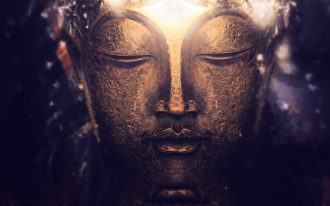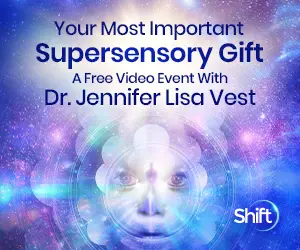Guest writer for Wake Up World
Buddhist monks, Hindu yogis, modern spiritual teachers, and Burning Man enthusiasts may all use the term “spiritual enlightenment” – but are they speaking about the same thing?
In this article I will explore what spiritual enlightenment is, both the traditional definition as well as the modern interpretation. There is no consensus around this topic, and it’s an area of intense metaphysical debate. My purpose here is to eliminate some misconceptions, and to discuss what are the optimal attitudes to develop in relation to this lofty goal.
Why is this important? Because the right attitude will empower you to live a deep and fulfilling life, while the wrong attitude will make you feel frustrated, inferior, or indifferent. However, I’m not here to convince anyone of anything. This article is primarily intended for those who have a spiritual practice and are interested in exploring the wisdom and traditions of the East.
Spiritual Enlightenment – Traditional and Modern Definitions
Original Definitions
The traditional concept of enlightenment comes from the spiritual traditions of India – notably the various schools of Yoga, Vedanta and Buddhism – and denotes the highest state of spiritual attainment. The end of the path.
Some of the synonymous for enlightenment, given by different schools of thought, are:
- Buddhism — Nirvana, Liberation, Awakening, Cessation
- Yoga — Liberation (moksha, mukti), Realization, Release, Aloneness (kaivalya), Union (yoga), Perfection (poorna)
- Vedanta — Self-realization, Self-knowledge, Jnana
All these traditions have several points of disagreement when it comes to defining the “metaphysical nature” of enlightenment. However, at their root they all seem to agree on at least three points:
- It is permanent (cannot be lost once attained)
- It involves transcending the ego
- It is the end of all forms of suffering
As you can see, the bar is high.
There are similarities between this concept and what is called Salvation or the “Kingdom of God” in Christian Mysticism, and “union with God” in Sufism, but exploring those is beyond the scope of this article.
Modern Conceptions
According to the Bhagavad Gita, only one in a billion people “knows the Truth”, that is, is Enlightened. Yet, nowadays there are many people who judge themselves to be enlightened. That being the case, for 99% of those people, one of the following is true:
- (a) They believe to be more advanced on the path than they actually are.
- (b) They postulate different levels of enlightenment, calling the traditional definition “full enlightenment”, and place themselves somewhere in that scale.
- (c) They consider the traditional definition of enlightenment to be mythical, exaggerated, or impossible. Unable to fathom even how to reach it, they redefine liberation according to their level of experience.
There will always be people in category “a”, and I’m not so worried about that. The ego is a master of deceit, and it can clock itself in spirituality too.
I also have no problem with category “b”, although I find it potentially confusing and misleading to name certain stages of the way as “enlightenment” when they don’t actually meet the traditional standards defined for this state (as per Hindu and Buddhist references).
“There are levels of experience. There are no levels of Realization.” – Ramana Maharshi (paraphrased)
There are many milestones on the way, after which deep and permanent transformations happen, and a lot of the possibility of future suffering simply drops away. I speak of this from having observed several teachers, and also from my own personal experience. These milestones are better called “awakening” – and there are many awakenings before final enlightenment/liberation.
Moving on, the real problem is people in category “c”. They are distorting the essential meaning of enlightenment. Perhaps they confuse certain awakenings along the way with full liberation, judging themselves to be enlightened.
In order to “make that work” for themselves, they need to redefine enlightenment in softer terms, so that it matches their level. And then, because there is obviously a lot of work still ahead for them, they either say that “enlightenment is a step in the journey and not the end of it” or they pretend that all which is still lacking is not important (like most neo-advaitins).
I don’t mean to say that everyone that claims to be enlightened is being deceitful – nor does it mean that they are not effective spiritual teachers. But, if they do not meet the “traditional requirements”, it seems to me they are either lacking humility or self-awareness. Or else they should use another word to describe their experience/state.
Looking on the bright side, however, even such watering down of enlightenment is beneficial for some people, since it makes it feel more achievable. With that comes increased motivation and dedication to spiritual practice.
Still, one can get that benefit without distorting the initial teaching. I’ll explore how towards the end of this post.
Gradual and Sudden
Many of the traditions mentioned above agree that enlightenment is already here and now, and that it is our true nature – or the true nature of reality. It is not that we have to achieve it or become it, but rather we need to remove the obstacles to its expression.
Some teachings regard liberation as a goal, something to be consciously and methodically worked towards. They emphasize the need to transform and purify the mind – or even transcend it altogether – through practices such as meditation, spiritual study, ethics, devotion, etc. We can call this the gradual approach.
Other traditions prefer to emphasize the “already present” aspect of enlightenment, and then center the teachings more around inquiring into your true nature and simply living in the present with non-attachment. We can call this the sudden approach.
In my own spiritual journey I have practiced for years under both of these frameworks. There are subtle differences in the type of language they use, the practices they recommend, and the people they attract.
Below is a list of “pros and cons” based on my own experience and observation.
Gradual Approach (example: Theravada Buddhism, Raja Yoga, etc.)
- Strengths
- Gives you a more systematic approach to spiritual growth
- More visible results, including for other areas of your life
- More tools and practices
- Easier to visualize your progress
- Traps
- Can trigger feelings of incompleteness, striving, and self-criticism
- Can increase a sense of spiritual ego
Sudden Approach (Zen, Dzogchen, etc.)
- Strengths
- Allows you to be more at ease in the present moment
- Simpler instructions and practices
- Easier to integrate into daily life
- Traps
- The lack of goals can lead to “spiritual lethargy”, and decrease motivation for practice
- It can be used as an excuse not to transform negative mental and behavioral patterns
- It can be confusing as to whether you are making progress or not, “doing it right” or not
- Can lead to a false sense of satisfaction and enlightenment
These approaches are both traditional, true and tested, and I respect them greatly. It is common to see seekers moving from one to another in different stages of their journey.
A combination of practices seems more desirable. Or at least being aware of the traps of your particular approach. The seeker in a gradual path can also cultivate the feeling that everything is perfect here and now, and that the true nature is always accessible. Conversely, the seeker on a sudden path can cultivate the practices and mental qualities of the “slow approach”, and contemplate the truth of sudden enlightenment, gradual cultivation.
A Direction, Not A Goal
Full enlightenment is possible, and is not only for monks. However, it is extremely rare. I believe that at any time in the world there are probably less than a hundred people in that peak of achievement.
The Two Attitudes
When this truth becomes clear about how elusive and rare full enlightenment is, many people feel discouraged, frustrated, or demotivated. The amount of effort involved is so great, and the time requirements are so considerable, that many just conclude that “enlightenment is not for me; I could never practice like those masters”. For most people, seeking it obsessively is actually a source of suffering.
All of these issues happen when we take enlightenment as a hard goal, and cling to it. And these problems all disappear the moment we make a small tweak in our mindset.
What is this tweak? To look at enlightenment as a direction, rather than a goal.
A goal is not always meant to be reached. It often serves simply as something to aim at.1 – Bruce Lee
This attitude also prevents the following problems: (a) feeling that you are not good enough, or worthy; (b) feeling frustrated with the slowness of your progress or the size of the road ahead; (c) wanting to give up; (d) watering down the original concept of enlightenment.
Once you regard it as a direction, you are much softer about it. You are able to better enjoy the path itself, without anxiety, and to grow towards liberation in a more organic way. It also becomes less likely that your spiritual search will negatively interfere with other aspects of your life.
Putting Things In Perspective
In many traditions, the teachings are quite binary: you are either ignorant, or enlightened. However, since enlightenment is so rare and elevated, this way of seeing things can often be unhelpful. There are like a thousand important milestones that can happen before full enlightenment, and many of these are life-changing. Acknowledging these “mini-awakenings” can help keep the seeker motivated and on track.
The advanced Yogis, monks and masters that we may compare ourselves to are in the peak of their path. They are like the Olympic athletes of meditation. Many of us are only serious amateurs, aficionados, or semi-professionals. Very few people will practice like those masters. But everyone – you included – can practice a little, and with time enjoy a much happier, more peaceful, and more meaningful life.
Of course, we can and ought to look up to those that completely embody the state of liberation, for the purpose of being inspired to walk in that direction. But this ceases to be helpful once it turns into a self-degrading comparison.
If the spiritual search is likened to the search for wealth, then the enlightened ones are the deca-billionaires. It takes a tremendous amount of effort combined with favorable conditions to arrive at that point.
But how many of us want to go that high? While very few people are ready to put in the effort and sacrifice to build that amount of wealth, most people can benefit from putting in some effort and arriving at a point of financial freedom. For the great majority of seekers, going from financial struggle to a million dollars in the bank is good enough. Which takes me to my next point.
Enjoying the Path and Growing Organically
The spiritual path exists so we can free ourselves from suffering. So we can find true peace, love, wisdom, meaning. So we can live a deep life, a life of truth. So let us learn to follow this path and grow in it in a gentle way – without violence towards ourselves (or others), for it defeats the purpose.
Let us learn to enjoy the path itself. Then there will be no sacrifice. No struggle. Only the natural expansion of consciousness.
If you force a child to grow up quickly and abandon all her toys, this will not be effective. Even if she grows up quicker than usual, she will resent this growth, and hold secret attachments to the toys that were given up prematurely.
If instead you simply facilitate her growth, a moment comes when the child feels like giving up those toys of her own accord. This is organic growth – painless, natural, and timely.
This type of growth is hindered when we try to compare ourselves to others on the spiritual path, pretend to be ahead of where we actually are, or cling hard to the ultimate goal. So let us avoid that trap and focus on the journey right now, where we actually are, one step at a time.
With time, as our practice deepens, there will be a sense of joy, peace, and freedom that comes from your spiritual practice that is unlike anything you can experience elsewhere. When that starts to happen… then whether it still takes you 5 months, 5 decades, or 5 lifetimes to achieve enlightenment, it won’t matter much. You are happy and well, in your unique place in the universe, and nothing else matters.
“The first signs of progress on the path of Yoga are perfect health, physical lightness, a luminous face, a beautiful voice, and freedom from craving.” – Svetasvatara Upanishad
Not bad, I’d say.
For my side of things, I don’t practice 16 hours a day like monks do, nor do I follow the teachings perfectly. I meditate 2 hours per day, and try to follow the principles and practices during the day to the best of my ability. And I can tell you, from personal experience, that the fruits of the first steps in the path of Liberation are more valuable than anything the world can ever offer me!
Keeping this in mind, and Enlightenment as a north (rather than an obsessive goal), I keep on the path happily, knowing I’m doing the best thing I could do with my life. Whether enlightenment exists or not, whether it is possible for me or not – seeking it seems to lead to a good life.
In a way, enlightenment and spiritual service is the goal and purpose of all my efforts. But from a more pragmatic perspective, I simply practice because I practice. I practice because it is the best way to live.
Parting Thoughts
Let us spiritual seekers take enlightenment seriously, without changing the original meaning of this state – lest we diverge into sidetracks that only take us half-way up.
Let us take enlightenment as a direction, a North – and not a hard goal to cling on to. If enlightenment happens, that’s great. If not, let us walk with the conviction that even the first true steps in the path of liberation already bring more life benefits and superpowers than anything we can find in this world.
Spirituality, in the end, is about finding the best way to live. Passionately explore your spiritual path; but also enjoy it.
When I started writing this article, I had a lot to say, and no idea how it would end. There is blood, sweat, and tears behind each of the lessons expressed in this post. My heart was pushing me to share this with all fellow seekers out there, and now my mind has finally caught up with these learnings and gave them form. May this be beneficial for your journey.
Also by Giovanni:
- How to Dissolve Negative Emotions into Emptiness
- Common Nature, Common Origins – The Philosophy and Practice of Oneness
About the author:
 Giovanni Dienstmann is a meditation and personal growth blogger. He has practiced meditation daily for the past 15 years, read hundreds of books on spirituality, tried numerous different practices, and spent time on retreats with teachers and instructors around the world – including zen ‘masters’, western teachers and Indian yogis. By deeply practicing and taking these teachings to heart, he found the peace and freedom he was looking for. His mission is now to bring meditation and personal growth to a million people.
Giovanni Dienstmann is a meditation and personal growth blogger. He has practiced meditation daily for the past 15 years, read hundreds of books on spirituality, tried numerous different practices, and spent time on retreats with teachers and instructors around the world – including zen ‘masters’, western teachers and Indian yogis. By deeply practicing and taking these teachings to heart, he found the peace and freedom he was looking for. His mission is now to bring meditation and personal growth to a million people.
“My mind is no longer my boss, and it doesn’t need to be yours either.”
Giovanni blogs at LiveAndDare.com and offers meditation coaching calls and chat at Coach.me

If you've ever found value in our articles, we'd greatly appreciate your support by purchasing Mindful Meditation Techniques for Kids - A Practical Guide for Adults to Empower Kids with the Gift of Inner Peace and Resilience for Life.
In the spirit of mindfulness, we encourage you to choose the paperback version. Delve into its pages away from screen glare and notifications, allowing yourself to fully immerse in the transformative practices within. The physical book enriches the learning process and serves as a tangible commitment to mindfulness, easily shared among family and friends.
Over the past few years, Wake Up World has faced significant online censorship, impacting our financial ability to stay online. Instead of soliciting donations, we're exploring win-win solutions with our readers to remain financially viable. Moving into book publishing, we hope to secure ongoing funds to continue our mission. With over 8,500 articles published in the past 13 years, we are committed to keeping our content free and accessible to everyone, without resorting to a paywall.









